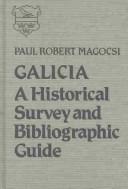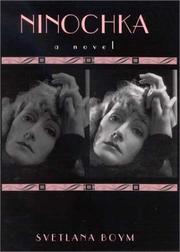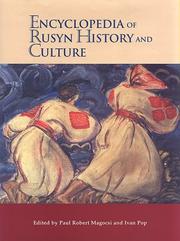| Listing 1 - 10 of 46 | << page >> |
Sort by
|
Book
ISBN: 1283805944 0809331047 9780809331048 9781283805940 9780809331031 0809331039 Year: 2013 Publisher: Carbondale
Abstract | Keywords | Export | Availability | Bookmark
 Loading...
Loading...Choose an application
- Reference Manager
- EndNote
- RefWorks (Direct export to RefWorks)
Ukrainians --- Ethnology --- Slavs, Eastern --- Ruthenians --- Social life and customs

ISBN: 1442675136 9786612009808 128200980X 9781442675131 9781282009806 0802024823 9780802024824 Year: 1990 Publisher: Toronto, [Ontario] ; Buffalo, [New York] ; London, [England] : University of Toronto Press,
Abstract | Keywords | Export | Availability | Bookmark
 Loading...
Loading...Choose an application
- Reference Manager
- EndNote
- RefWorks (Direct export to RefWorks)
Galicia, an eastern European region that has been ruled by Poland, Austria, and the USSR at various times, has played an important and often crucial role in the Ukrainian historical development. This is the first comprehensive bibliographic guide to its history.The over-all arrangement is chronological and within that by theme. The book emphasizes political, socioeconomic, literary, linguistic, and archeological developments as they are recorded in fourteen languages. It contains more than 3000 references, 1000 notes, a detailed thematic and name of index, and six maps which trace the historical development of Galicia.Although Ukrainians have traditionally made up the largest part of Galicia's population, substantial minority populations of Poles, Germans, Armenians, Karaites, and most especially Jews have lived in the region at various times. The extensive literature on Galicia's Jews is brought together in this volume for the first time.This volume is published in association with the Harvard Ukrainian Research Institute and the Canadian Institute of Ukrainian Studies. It won the 1982 Cenko Prize for the best work published in Ukrainian bibliography.
Ukrainians --- Ethnology --- Slavs, Eastern --- Ruthenians --- History. --- Galicia (Poland and Ukraine) --- History
Book
ISBN: 8024634112 9788024634111 9788024633299 Year: 2016 Publisher: Praha
Abstract | Keywords | Export | Availability | Bookmark
 Loading...
Loading...Choose an application
- Reference Manager
- EndNote
- RefWorks (Direct export to RefWorks)
Ruthenians --- Rusini --- Rusins --- Rusiny --- Rusnatsi --- Rusyns --- Rusyny --- Ruthenen --- Ruthenes --- Ethnology --- Slavs, Eastern --- Carpatho-Rusyns --- Ukrainians --- History.
Book
ISBN: 9780299303433 0299303438 9780299303440 0299303446 Year: 2015 Publisher: Madison, Wisconsin The University of Wisconsin Press
Abstract | Keywords | Export | Availability | Bookmark
 Loading...
Loading...Choose an application
- Reference Manager
- EndNote
- RefWorks (Direct export to RefWorks)
Ukrainians --- Ukrainian diaspora. --- Ethnology --- Slavs, Eastern --- Ruthenians --- Diaspora, Ukrainian --- Human geography --- Folklore. --- Ethnic identity. --- Migrations
Book
ISBN: 9004441093 9004434895 Year: 2021 Publisher: Leiden, The Netherlands : Brill,
Abstract | Keywords | Export | Availability | Bookmark
 Loading...
Loading...Choose an application
- Reference Manager
- EndNote
- RefWorks (Direct export to RefWorks)
In The Pechenegs: Nomads in the Political and Cultural Landscape of Medieval Europe, Aleksander Paroń offers a reflection on the history of the Pechenegs, a nomadic people which came to control the Black Sea steppe by the end of the ninth century. Nomadic peoples have often been presented in European historiography as aggressors and destroyers whose appearance led to only chaotic decline and economic stagnation. Making use of historical and archaeological sources along with abundant comparative material, Aleksander Paroń offers here a multifaceted and cogent image of the nomads’ relations with neighboring political and cultural communities in the tenth and eleventh centuries. Readership: All those who are interested in the history of medieval nomadic peoples in Europe, and anyone seeking to understand the relations of nomads of the late pre-Mongol epoch with the outside world.
Slavs, Eastern --- History. --- General and world history --- Nomads --- Pecheneg (Turkic people) --- History

ISBN: 0791486516 141753611X 9781417536115 0791457737 9780791457733 0791457745 9780791457740 9780791486511 Year: 2003 Publisher: Albany State University of New York Press
Abstract | Keywords | Export | Availability | Bookmark
 Loading...
Loading...Choose an application
- Reference Manager
- EndNote
- RefWorks (Direct export to RefWorks)
A Russian émigré living in New York travels to Paris to try to reconstruct the secret life of another Russian woman who was murdered there on the eve of World War II.
Conspiracies --- Women immigrants --- Russian Americans --- Russians --- Americans --- Women detectives --- Ethnology --- Slavs, Eastern --- Female detectives --- Detectives --- Paris (France) --- Russia (Federation)

ISBN: 9786612014611 1282014617 1442674431 9781442674431 9781282014619 0802035663 9780802035660 Year: 2005 Publisher: Toronto
Abstract | Keywords | Export | Availability | Bookmark
 Loading...
Loading...Choose an application
- Reference Manager
- EndNote
- RefWorks (Direct export to RefWorks)
The Carpatho-Rusyns are central European people, numbering approximately 1.2 million, who live within the borders of five states: Poland, Slovakia, Ukraine, Romania, and Hungary. They have never had a state of their own. Disregarded and suppressed by most governments that ruled over them in the past, the Rusyn people have had to fight to retain their identity, culture, and language. This work is an attempt to redress the loss of historical memory and knowledge caused by decades of repression by investigating and explaining the historical past and culture of Rusyns in all countries where they live, including immigrant communities in the United States, Canada, and Yugoslavia. The encyclopedia contains over 1,100 alphabetically arranged entries in areas such as individuals, organizations, political parties, periodicals, historical terms, geographic regions, historical events, and on themes such as architecture, archaeology, cinema, communism, ethnography, geneaology, geography and economy, historiography, history, the internet, language, literature, nationalism, printing and publishing, and radio and television. The first encyclopedic work on Rusyns to appear in English, this book has laready proven to be an indispensable resource for European and Slavic studies specialists, and for general readers interested in international relations and nationalism. The Revised and Expanded Edition has been fully updated: New data and references have been provided for most existing entries ans many entirely new entries have been added.
Carpatho-Rusyns --- Carpatho-Rusins --- Carpatho-Russians --- Carpatho-Ruthenians --- Subcarpathian Rusyns --- Uhro-Rusyns --- Ethnology --- Slavs, Eastern --- Ruthenians --- Russinen.
Book
ISBN: 1487514263 9781487514266 9781487501945 1487501943 1487514271 Year: 2018 Publisher: Toronto
Abstract | Keywords | Export | Availability | Bookmark
 Loading...
Loading...Choose an application
- Reference Manager
- EndNote
- RefWorks (Direct export to RefWorks)
In Minority Report, Leonard G. Friesen and the volume's contributors boldly reassess Mennonite history in Imperial Russia and the former Soviet Ukraine.
Mennonites --- Ukrainians --- Mennonites. --- Anabaptists --- Baptists --- Christian sects --- Ethnology --- Slavs, Eastern --- Ruthenians --- History. --- Ukraine --- Ethnic relations. --- Church history.
Book
ISBN: 3838267028 9783838267029 3838207025 9783838207025 9783838206523 3838206525 Year: 2015 Publisher: Stuttgart
Abstract | Keywords | Export | Availability | Bookmark
 Loading...
Loading...Choose an application
- Reference Manager
- EndNote
- RefWorks (Direct export to RefWorks)
Russians --- Ethnology --- Slavs, Eastern --- Social conditions --- East Europeans --- Friendship --- Affection --- Friendliness --- Conduct of life --- Interpersonal relations --- Love --- Eastern Europeans --- Europeans
Book
ISBN: 2271091179 2271066212 Year: 2016 Publisher: Paris : CNRS Éditions,
Abstract | Keywords | Export | Availability | Bookmark
 Loading...
Loading...Choose an application
- Reference Manager
- EndNote
- RefWorks (Direct export to RefWorks)
France terre d’asile ? Dans les années 1920, la France accueille près de 80 000 Russes ayant quitté leur pays à la suite de la révolution, plus que la plupart des pays européens. Comment répondre à cet afflux de population ? Comment les accueillir, où les installer ? Quel statut leur accorder ? Ces questions ne relèvent pas de la seule politique intérieure française : elles acquièrent avec la création du Haut Commissariat aux Réfugiés une dimension internationale. Au croisement du droit, de la diplomatie et de la sociologie, Catherine Gousseff nous relate l’élaboration du statut de réfugié. Elle met particulièrement en avant l’assistance des associations caritatives et le rôle politique des élites russes auprès de la Société des nations. Une question politique et humaine qui est encore la nôtre.
Russians --- Political refugees --- History --- Soviet Union --- Refugees. --- Ethnology --- Slavs, Eastern --- réfugiés russes --- réfugiés politiques --- Russes --- immigration --- émigration
| Listing 1 - 10 of 46 | << page >> |
Sort by
|

 Search
Search Feedback
Feedback About UniCat
About UniCat  Help
Help News
News